Tips and advice for foreigners looking to rent in Germany. From navigating the rental market to understanding legal requirements, our guide provides valuable insights to help you successfully secure a rental property in Germany.
Key takeaways
- Finding a house to rent in Germany is difficult for foreigners. It can take up to 6 months to find a decent place to rent in Germany.
- Check multiple property rental platforms daily to find an apartment to rent.
- Be the first to message the landlord. Always briefly introduce yourself in the first message you send to the landlord.
- Keep your documents ready and bring them with you during your visit to the potential rental property.
- Never pay the rent or the security deposit in cash. Many scammers will take your money and disappear.
- Check the rental contract carefully and negotiate the contract terms if required.
- Finding an apartment to rent in Germany is difficult when you are abroad. So, consider booking temporary accommodation instead.
- You need “Wohnungsgeberbescheinigung” from the landlord to register yourself at the local town hall of your city. Registering at the local town hall is mandatory for every resident in Germany. After registering, you will get your health insurance card, income tax, social security number, and other essential documents.
- There are several cases of rental property scams in Germany. Hence, redact critical personal data before sharing it with the landlord. Moreover, never transfer the security deposit before visiting the property and signing the tenancy agreement.
Table of contents
German Rental Market
Different types of rental properties in Germany
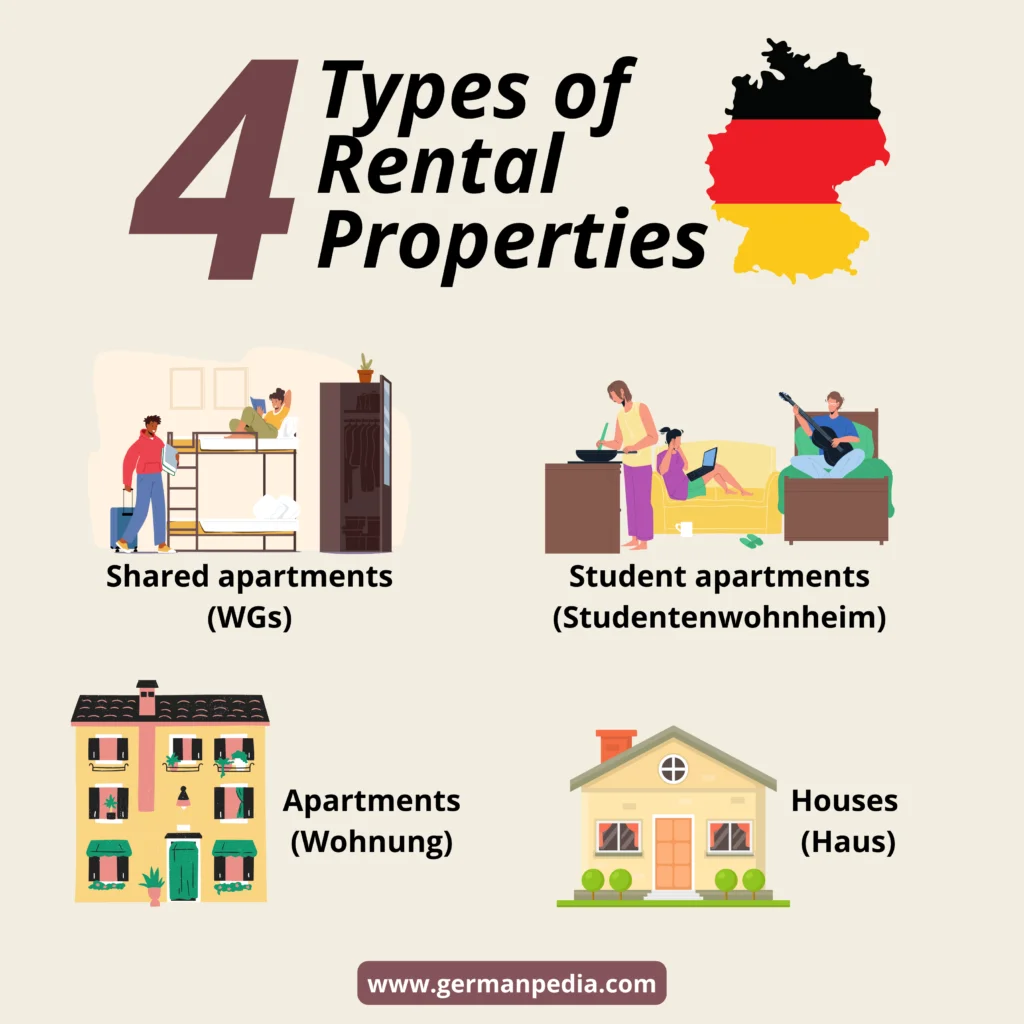
There are four types of rental properties in Germany.
- Shared apartments (WGs): Apartments where more than one tenant lives together and shares expenses.
- Student apartments (Studentenwohnheim): One can compare them to dormitories or hostels. As the name suggests, only students enrolled in a German university nearby can rent a student apartment.
- Apartments / Condominium / Multi-family house (Wohnung)
- Houses (Haus)
I have divided this guide on renting an apartment in Germany based on your current situation, i.e., are you a student, a single professional, or have a family?
Most things about renting a property in Germany remain the same, but a few changes depending on your professional and personal status.
Expats guide to buying a house in Germany

- The process of buying a house in Germany.
- How do you evaluate a property in Germany?
- What documents should you check before buying a house in Germany?
- How do you get a mortgage from a German bank?
- Tips and tricks to save thousands of euros.
- Average renovation costs in Germany and more…
Guide for students on renting an apartment in Germany
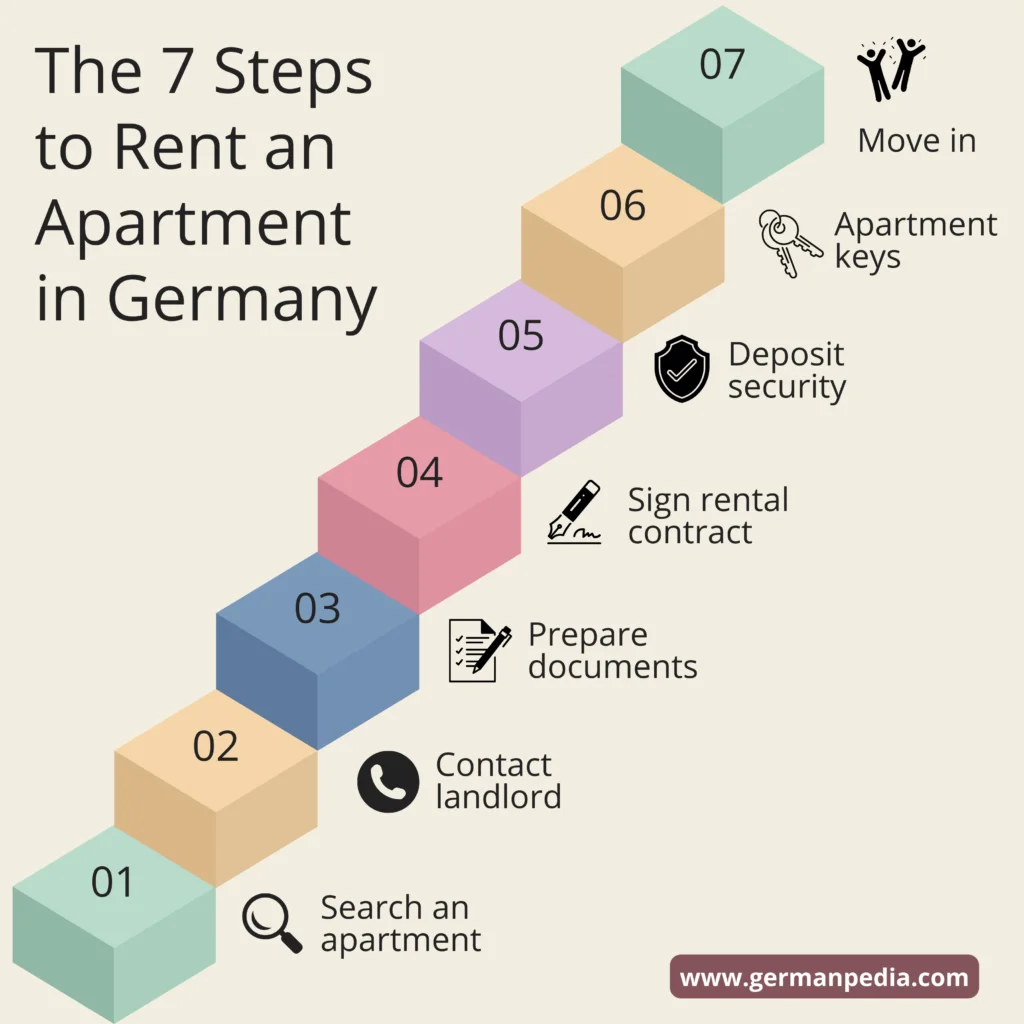
The renting process in Germany consists of 7 steps.
- Find an apartment that fits your needs
- Contact the landlord
- Prepare your documents and visit the property
- Check and sign the rental contract
- Transfer the security deposit (Kaution) via bank transfer
- Get the key to the property and necessary documents from the landlord (Übergabeprotokol)
- Move into your new home
Step 1: How to find a rental property in Germany?
For students, the following two factors are vital while searching for apartments in Germany.
- Furnished apartment
- Low monthly rent
Hence, students look for a furnished shared apartment (Wohngemeinschaft (WG)) or a student apartment (Studentenwohnheim) with low monthly rent.
Here are a few ways to search for apartments for rent in Germany.
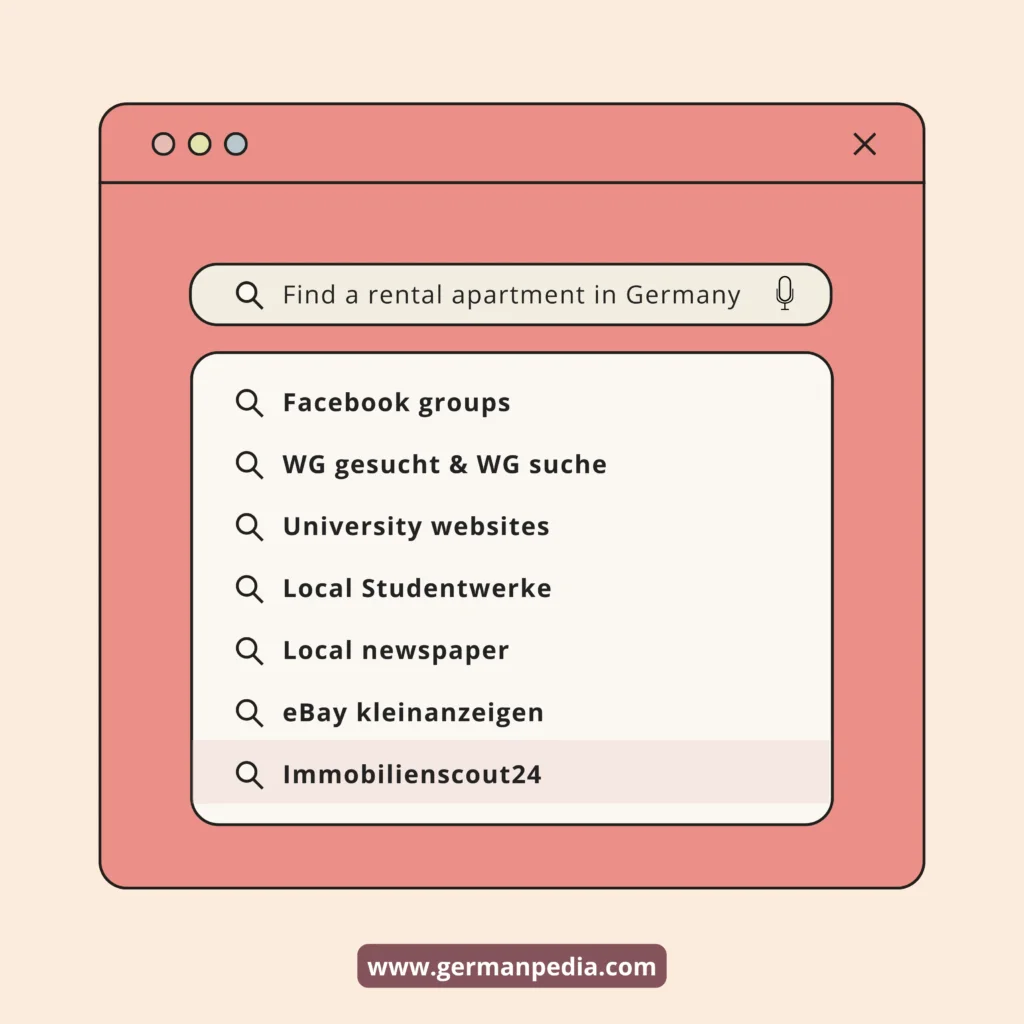
Facebook groups
Every city in Germany has a Facebook group created and run by fellow expats living in that city. Similarly, students coming from abroad create a Facebook group based on their university.
You can find these Facebook groups by searching
- expats in <city name>, eg: expats in Stuttgart
- auslaender in <city name>, eg: auslaender in Berlin
- foreigners in <city name>, eg: foreigners in Munich
- <country name> in <city name>, eg. Americans in Berlin
- <city name> international students
- <university name> international students
In Facebook groups, members post a lot of valuable information, including apartments for rent.
The advertiser can rent the rooms or apartments for the long term (a few years to unlimited) or the short term (a couple of months). Thus, don’t be surprised when you see a post on renting an apartment or a room for a few months.
Due to the high demand for student rooms, you must be the first to reply to the advertiser.
TIP: Set up alerts on Facebook to get notifications when a post to rent an apartment goes live.
WG Gesucht & WG Suche
WG gesucht is one of the best online property portals to look for a student apartment or flatshare in Germany. Here you’ll typically find rooms or apartments for rent for the long term.
WG Suche is similar to WG gesucht and can be used to find shared apartments.
University websites
Universities know how tough it is to find a rental property in Germany, especially for foreign students. Thus, to help international students, universities have a webpage or forum where students can find a room or an apartment to rent.
For example, the University of Stuttgart has an “Accommodation for International Students” webpage.
Students can find links to other organizations, processes, help, etc., on this page to find a rental property.
I recommend checking the university’s website or contacting your student coordinator for help in finding a room to rent.
Local Studentenwerke website
Studentenwerke is a state-run non-profit organization. They help students find accommodation and many other challenges a student faces.
Google “Studentenwerk <city name>” to find the local Studentenwerk.
💡 NOTE: Usually, there is a long waiting to rent a room or apartment listed on Studentenwerk. Thus, apply at least a semester or a year before.
Local newspaper
As per DESTATIS, Germany has an aging population, with 30% of the population aged above 60 years.
The older population of Germany still prefer using Local newspaper to post rental property advertisements. Thus, check local newspapers to find listings of budget-friendly apartments to rent.
Here is a list of news portals in Germany.
eBay kleinanzeigen
eBay kleinanzeigen is a popular marketplace in Germany to buy and sell used products. People also use it actively to post advertisements for rooms or properties to rent.
Other websites you can use are
Websites to find short-term furnished apartments
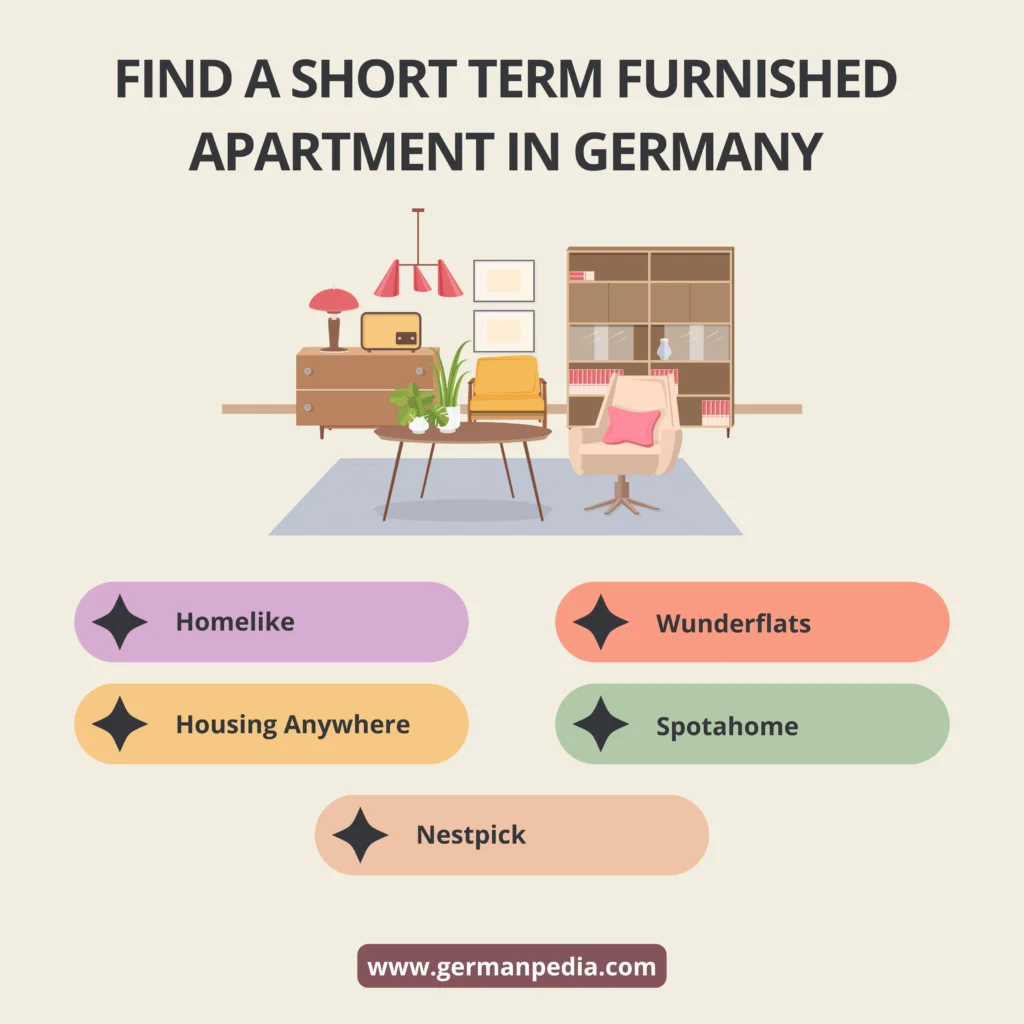
What does a typical student hostel or living in a shared apartment look like in Germany?
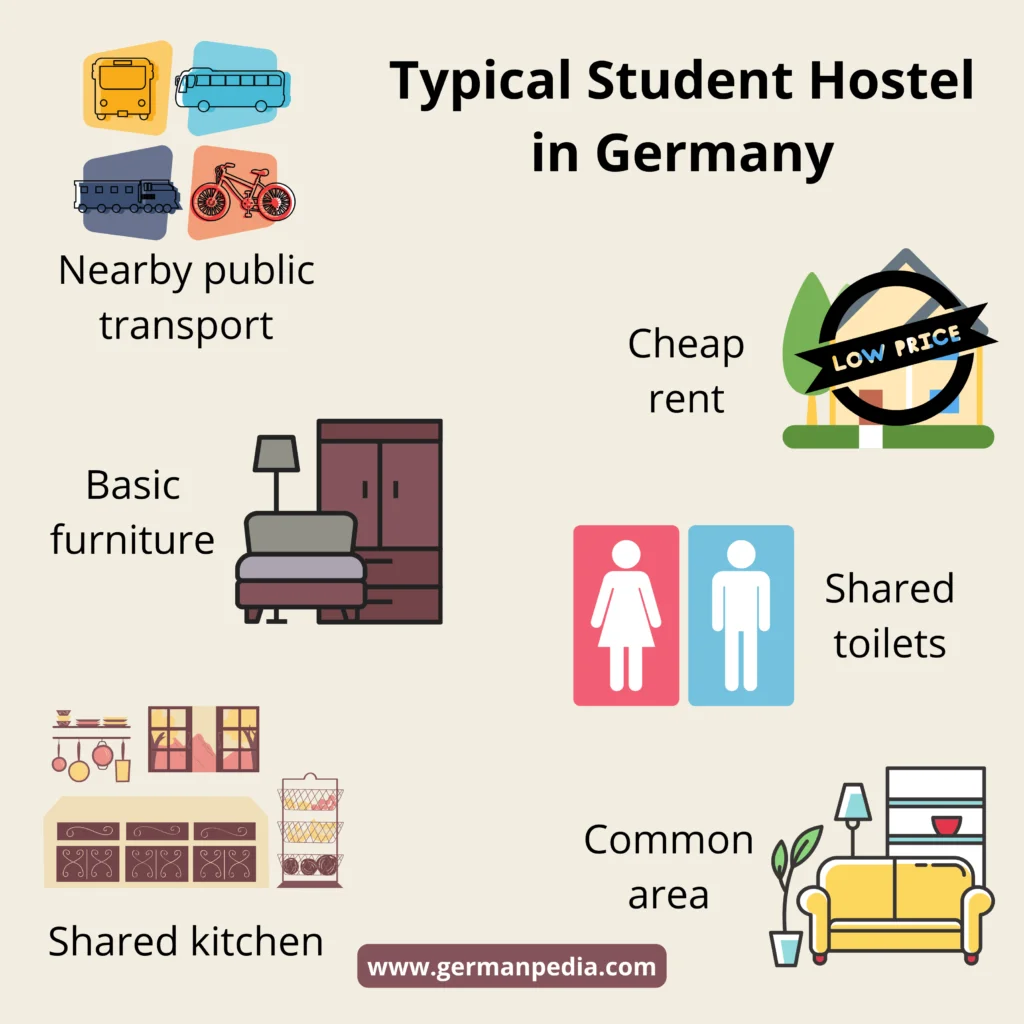
Builders construct student apartments keeping the students’ needs in mind. Here are the typical characteristics of a student apartment.
- The rent of these properties is cheaper than other apartments or houses in Germany.
- The rooms have the basic furniture a student may need. Usually, it includes a single bed with a mattress, a table, and an almirah.
- Student dorms have shared toilets and bathrooms.
- Students share the kitchen and the utensils.
- Some accommodations even have a common area where you can eat, watch television, organize parties, or play games.
- Most of the student apartments are coed.
- One can access public transport from these properties in a few minutes on foot.
Keeping the room and the common areas clean is the students’ responsibility. The housemaster may charge students a fine if the common areas or their rooms are not clean.
In some buildings, housekeeping cleans the toilet and the bathroom. In others, students have to clean it.
While living in student apartments, you’ll meet a lot of interesting people from all around the world. You’ll learn about different cultures, food, languages, and more.
In short, life in a student dorm is exciting, and we recommend every international student experience it once.
Step 2: How to contact the landlord/real estate agent/advertiser in Germany?
Always call the advertiser if you have their contact number. Else, write them a message online.
Writing a message is an art. And the quality of the message will determine whether the landlord will reply or not.
Many people don’t put effort into writing a good message. Hence, don’t receive a reply from the landlords.
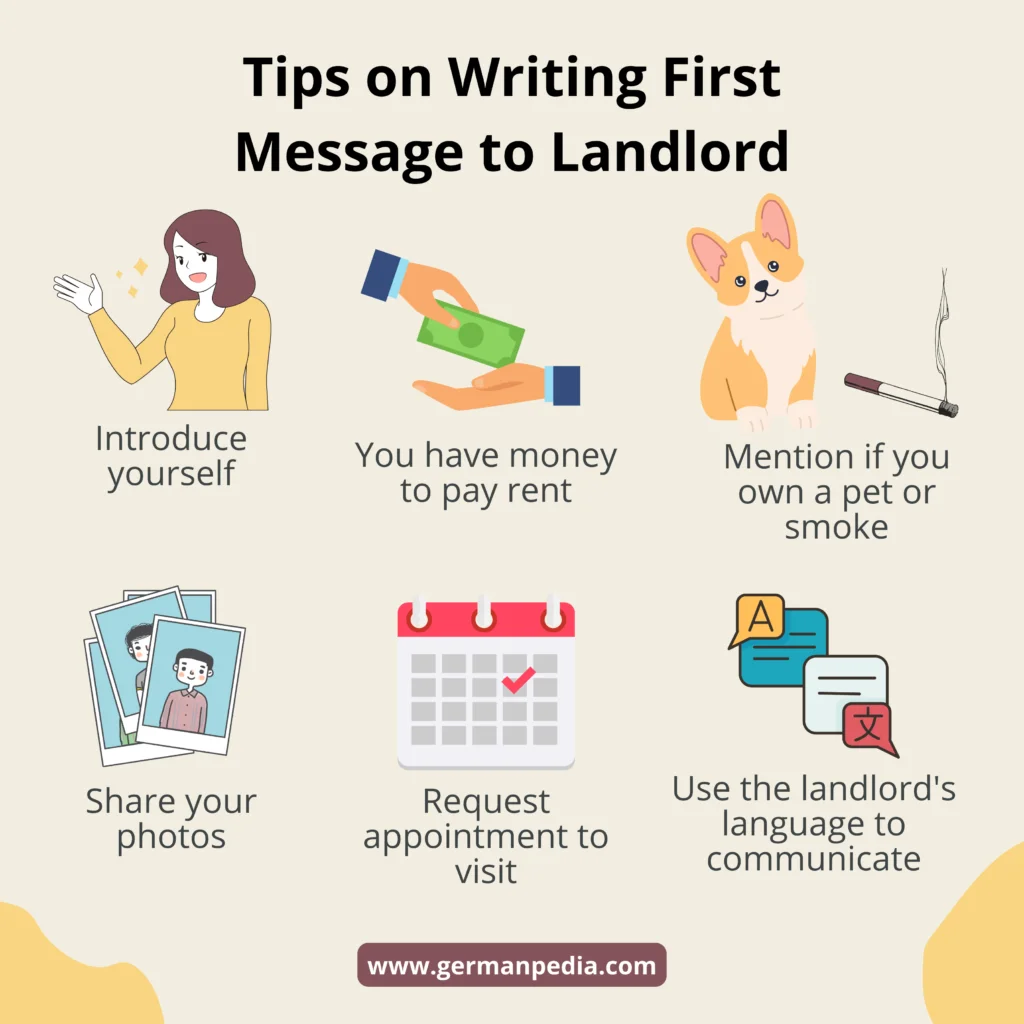
You should mention the following in your first message to the German landlord.
- Introduce yourself. Tell them where you are from, how long you have been in Germany, what you do, your hobbies, etc.
- Convince the landlord that you have money to pay rent; you are friendly and someone who will keep the property clean.
- Be transparent and inform the landlord if you own a pet or smoke. It’ll save you and the landlord a lot of time.
- Many people are not comfortable sharing their photographs with the landlord. And you can use it as an opportunity to stand out from the crowd. So, consider sharing one or two photos of yours in your message.
- In the end, finish the message with a request for an appointment to visit the property.
- Try to write the message in the language used in the advertisement. If it is English, write in English. If it is German, write in German. Suppose your German is not so good. Use Google Translate or DeepL to convert your message from English to German.
Here is an example of a good message that will receive a reply from the landlord.
Hello Mr./Ms. ____________,
I saw your advertisement on _______ . I am interested to rent the <room/apartment/house>.
My name is ______. I am a master student in _______. I am working as a student at Bosch and earn 1300 € per month.
I am from Austria and living in Stuttgart for 1 year now. I am single, quite, friendly guy who like to read and binge watch series. I am a non-smoker with no pets.
Although my income is enough to cover the rent and my expenses. Still, my parents would be happy to act a guarantor, in case I am not able to pay the rent on time.
Can you give me an appointment to visit your apartment.
Feel free to call me or send me an email, if you need any other information.
Looking forward to a positive reply.
Regards,
My Name
+49-176-xxx xxx xx
abc[at]gmail.com
NOTE: Translate the message into German if the property advertisement is in German.
Step 3: What documents do you need to rent an apartment in Germany?
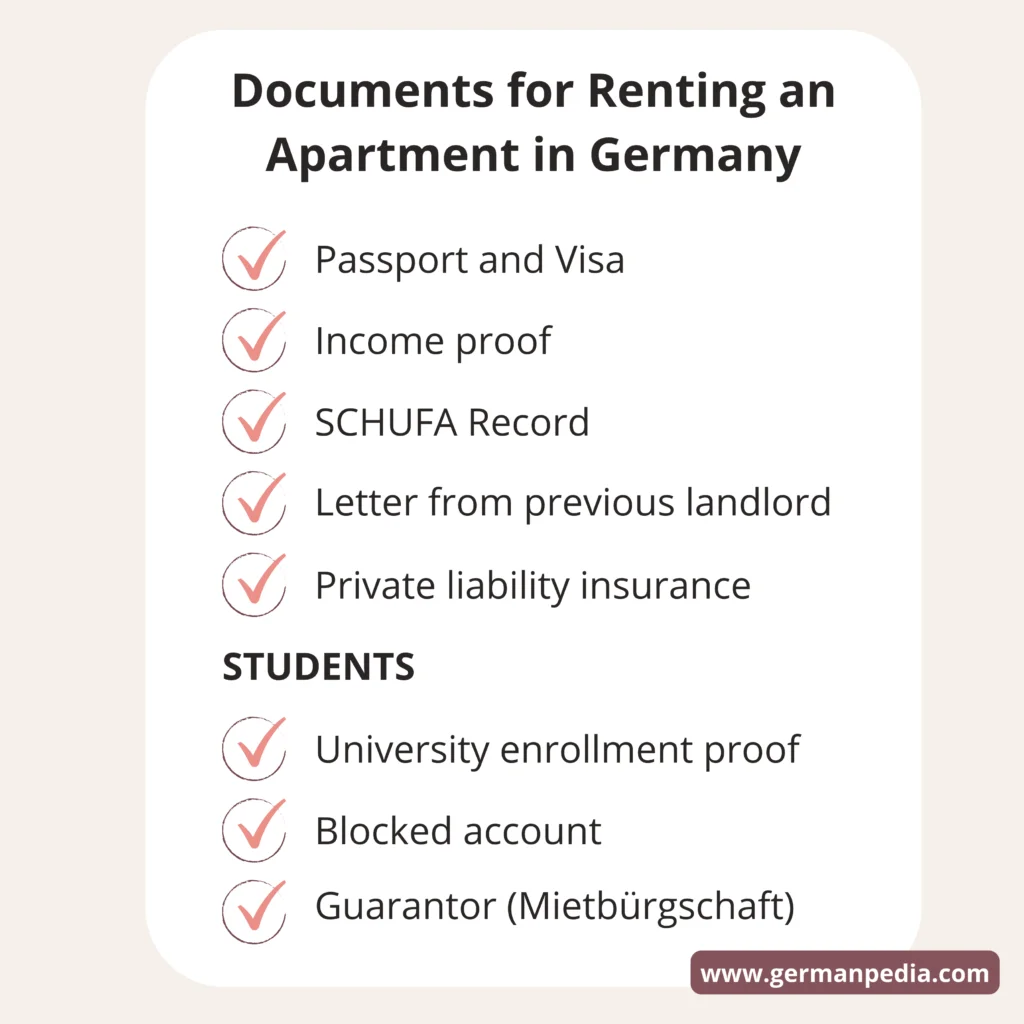
To rent an apartment in Germany, you should bring the following documents during your first visit.
- Passport
- Visa
- University enrollment letter / ID card (For students only)
- Blocked account: International students have to open a Blocked Account in Germany to prove that they can sustain their living expenses in Germany for at least one year.
- Guarantor (Mietbürgschaft) (Optional): Someone who takes the responsibility to pay the rent if you cannot pay it.
- Letter from the previous landlords (Mietkostenfreiheitsbescheinigung) (Optional): Sometimes, landlords may ask for a letter from your last landlord to know if you have any pending debt or unpaid rent.
- Income proof: You must prove that you can pay rent on time. To do so, you can show a job contract, along with the last three months’ salary slips. You can also show your bank statement or blocked account, as mentioned above. A guarantor and a blocked account are handy if you do not have a job.
- SCHUFA record (Optional): As per Wikipedia, SCHUFA is a private German company that performs credit checks and create credit report on individuals and companies. SCHUFA record helps landlords verify your financial credibility. We recommend showing your SCHUFA certificate to the landlord. You can order one from “meinschufa.de*.”
- Personal/private liability insurance (Haftpflichtversicherung): This insurance is not mandatory but highly recommended for everyone in Germany. It protects the insured person in the cases they cause damage to a third party. Some landlords demand it, and some do not. Nevertheless, it’s good to have one.
Take all the above-mentioned documents while visiting the rental apartment. However, show your documents only if you like the new place.
In the end, you must understand the landlord’s perspective. No one wants to rent their property to someone who cannot pay rent on time or seems loud and untidy.
Thus, dress appropriately and bring all the necessary documents to your first visit. It reflects well on your character and leaves a good impression.
Step 4: Check and sign the rental contract
It’s important to understand the terms and conditions of the rental contract before signing it.
Most rental contracts in Germany are standard. But it’s vital to know your rights as a tenant to negotiate the T&C of the tenancy agreement.
Step 5: Transfer the security deposit (Kaution)
Once you have signed the rental contract, transfer the security to the landlord.
Security deposit is usually the 3 months cold rent in Germany.
⚠️ WARNING: There are a lot of scammers who will ask you to pay in cash or send money via means other than a bank transfer, eg: WesternUnion. Beware of such scams and always transfer money via bank transfer.
Step 6: Get the apartment keys and required documents
Congratulations, you have found your new home.
In Germany, the process of getting keys is called Schlüsselübergabeprotokoll or Übergabeprotokoll. In this process, you meet the landlord or a real estate agent on-site and do the following.
- You get the house keys.
- You get a property tour, where you inspect the apartment with the landlord or real estate agent to find and document any known or visible problems.
- The landlord will record the readings of the electric, water, heating, and gas meters.
- You can ask questions to the landlord about the neighbors or the essential places nearby.
- You will also get a document (Wohnungsgeberbescheinigung) from the landlord stating that you live in this apartment/house. You need this document to register at the local town hall (Rathaus). In Germany, every resident must register in the local city hall within 2 weeks of moving to a new city or house.
Sometimes, you do not or cannot meet the landlord on-site. In such a scenario, the landlord puts the room or the property keys in the post box.
NOTE: It is essential that you report any visible problems to the landlord in writing within 48 hours or as mentioned in your contract.
So, this is the last step in your journey to find a rental property in Germany. After this step, all you need to do is to move in.
Guide for single professionals on renting an apartment in Germany
Many single professionals prefer living in a flatshare to save on rent.
The whole process of finding housing in Germany is the same as described above. The only difference comes in the message you write to the landlord.
Here is an example of a good message.
Hello Mr./Ms. <Name of the Landlord>,
I saw your advertisement on _______ . I am interested to rent the <room/apartment/house>.
My name is ______. I am working as a Product Manager at IBM for 5 Years and have a regular income of 4300 €.
I was living in Munich for 5 years and now moving to Stuttgart to support the new team in IBM. I am a quite, friendly person who like to travel and read. I have no pets and do not smoke.
Your apartment fits my needs perfectly. Can you give me an appointment to visit it.
I would be happy to share more information about me on our visit.
Looking forward to hearing from you soon.
Regards,
________
+49-176-xxx xxx xx
abc[at]gmail.com
NOTE: Translate the message into German if the property advertisement is in German.
Guide for families to rent a property in Germany
Many landlords prefer renting to a family.
The reason is families stay longer and maintain the property better than a bachelor or a student. Thus, landlords who do not want to search for a new tenant every other year prefer renting to a family.
Again, the process of finding and renting a house remains the same. The only difference is that you’ll also need your wife’s documents.
Also, share information about your family while contacting the landlord. For example,
- the number of kids,
- your family photograph,
- what you like to do as a family,
- your wife’s profession, etc.
Expats guide to buying a house in Germany

- The process of buying a house in Germany.
- How do you evaluate a property in Germany?
- What documents should you check before buying a house in Germany?
- How do you get a mortgage from a German bank?
- Tips and tricks to save thousands of euros.
- Average renovation costs in Germany and more…
8 things to know about German apartments for rent
How do Germans count the number of rooms in an apartment?
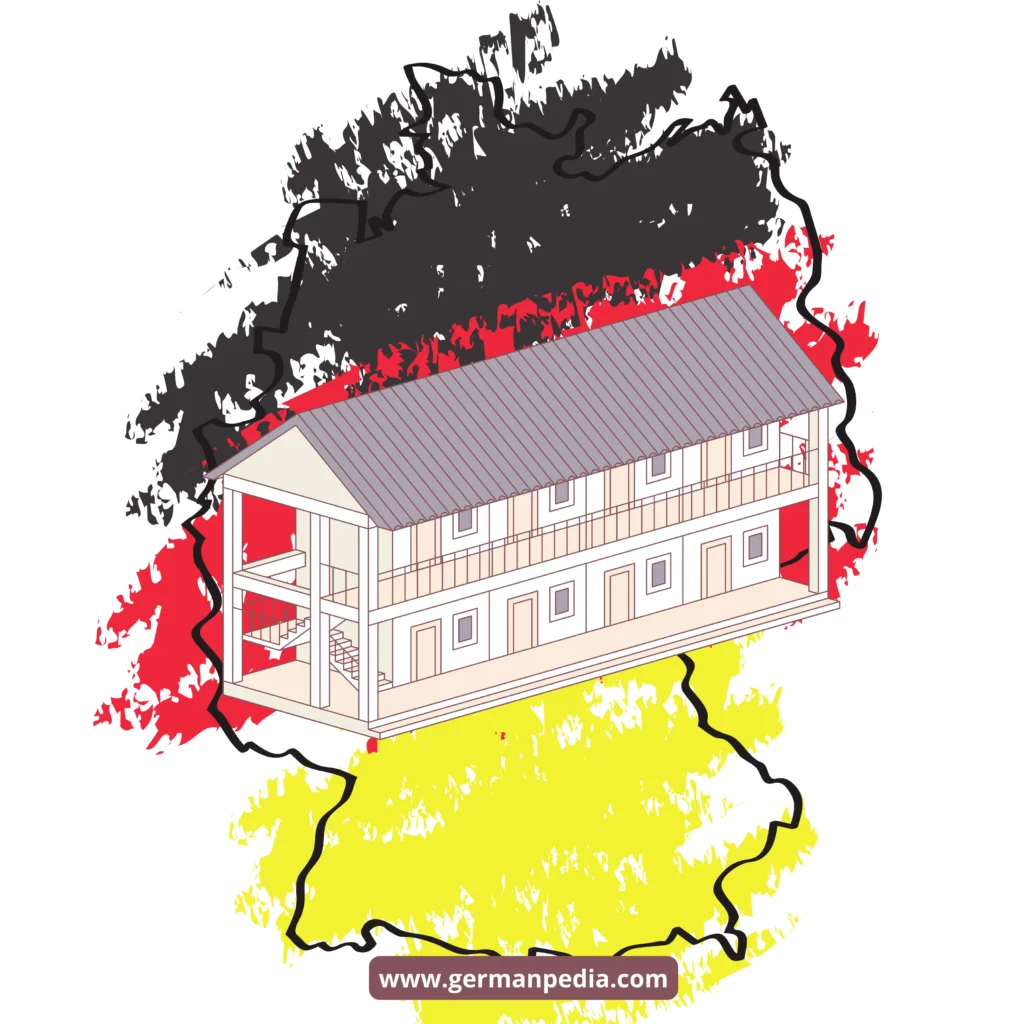
Unlike states and many other countries, Germans count all the rooms in the apartment except the kitchen and toilet.
For example, if your apartment has two bedrooms and a living room, it’ll be advertised as a 3 rooms apartment (Dreizimmerwohnung) in Germany.
Rent breakdown
The total rent (Warm rent) of an apartment in Germany consists of two parts.
- Cold rent
- Utility costs
Cold rent is the rent of the apartment. On top of it, the landlord can add
- rent of the parking space,
- rent of the furniture (if furnished),
- and utility costs, e.g., heating, cleaning service, etc.
Furnished vs. unfurnished apartments in Germany
No furniture
Usually, rental apartments in Germany are unfurnished. You don’t even have lights (bulbs or lamps) in the rooms; forget about the kitchen.
For people who have been living in Germany for some time, it might not be a problem. But for the expats moving to Germany, renting an unfurnished apartment can be challenging.
Fitted kitchen
Some apartments in Germany come with a kitchen. There could be two possibilities here:
- The landlord installed the kitchen.
- You can buy the installed kitchen from the previous tenant.
The rent of the apartments where the landlord provides a fitted kitchen is relatively more than the unfurnished.
Furnished apartments
The third category is furnished apartments. Here you’ll find all the basic amenities like a bed, study table, almirah, internet, etc.
Usually, furnished apartments are only available for the short term and charge double the rent compared to an unfurnished apartment.
If you get lucky and the previous tenant wants to sell some of their furniture at a reasonable price, you can save yourself the hassle of buying furniture.
House service (Kehrwoche (Schwäbische Kehrwoche))
A house service is in charge of keeping the common areas of the apartment building clean, removing snow from the front of the building, maintaining the garden if the building has any, etc.
Unfortunately, not all apartment buildings in Germany offer house service.
In some German cities, it’s actually very common not to have a house service. In this case, the residents of the apartment building take turns in cleaning the common areas.
The frequency of cleaning the common areas is usually weekly. Hence, it’s called Kehrwoche (Sweeping Week) in German.
Some people don’t prefer to clean the stairs, washing area, cycle parking space, etc, once every month or two. So, check if your rental apartment offers house service before signing the contract.
Your contact when renting an apartment in Germany
- Landlord, owner of the property
- Previous tenant looking for their replacement
- Real estate agents
- The tenant subletting the room
- Property management (Hausverwaltung)
Depending on your situation and the apartment, your contact might be different. It’s good to know who your contact is while renting an apartment.
Rent bracket (Mietpreisbremse)
German law regulates the rent. Thus, the landlords cannot ask for a rent of 10% more than the comparative rent in the area.
There are other limitations that the German government imposes to control the abrupt rise in rental prices.
So, consult with a Mieterverein or a real estate lawyer if you think your apartment’s rent is too high. If you are right, you’ll pay less rent in the future and get back the extra rent paid in the past.
Limited vs. unlimited rental contracts
As per German law, rental contracts must be for an unlimited period. The landlords can draft a rental contract with a fixed period only when there is a strong reason.
Moreover, even if you sign the contract with a fixed period, it isn’t valid under the law.
Consult your tenants’ associations (Mieterverein) or a real estate lawyer when in doubt.
Documents you will need/get from the landlord in Germany
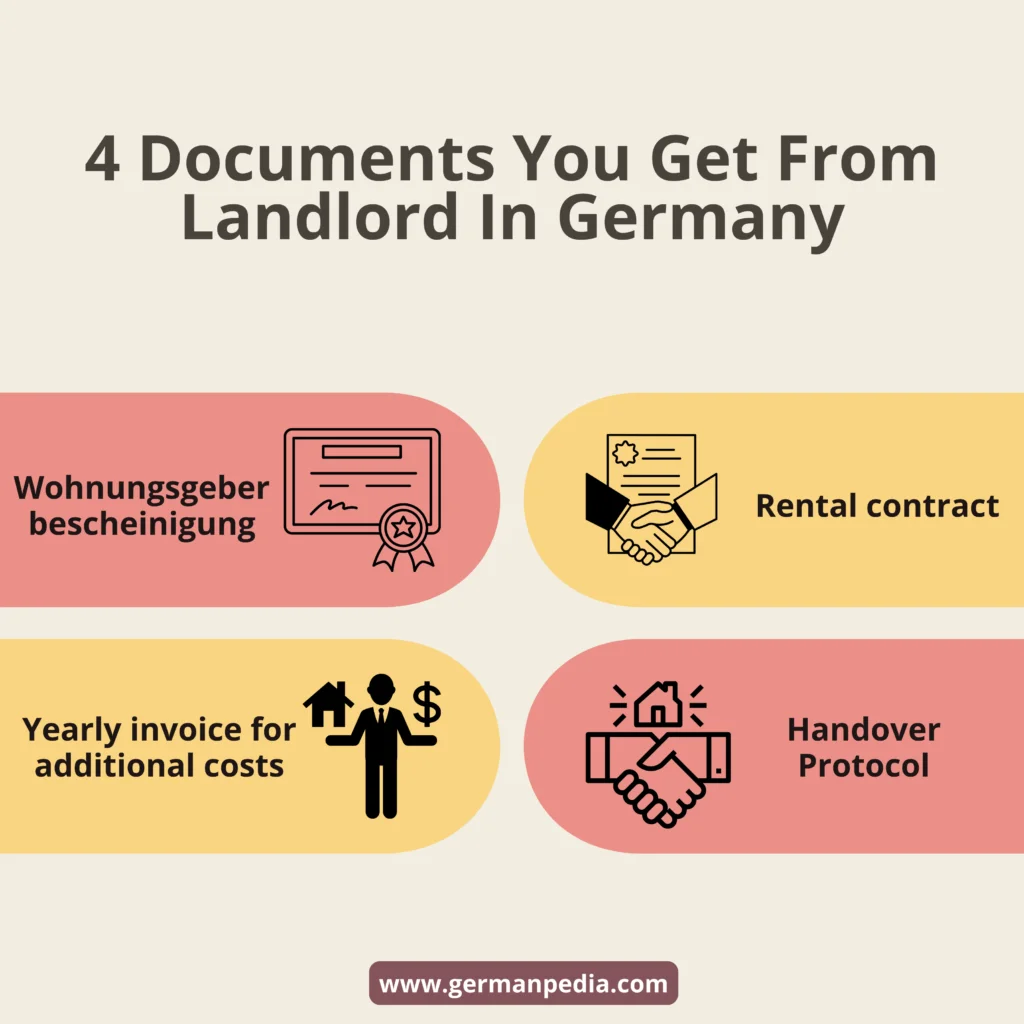
You will get the following documents from your landlord.
- Wohnungsgeberbescheinigung
- Handover Protocol (Übergabeprotokol)
- Yearly invoice for additional costs (Nebenkostenabrechnung)
- Rental contract
Wohnungsgeberbescheinigung
You will need this document to register at your local town hall (Rathaus).
In Germany, everyone must register at their town hall (Rathaus) within 14 days.
Why does my landlord refuse to provide me with Wohnungsgeberbescheinigung?
There is a big gap between the supply and demand of affordable housing in Germany. As a result, you may find many rental properties that do not provide Wohnungsgeberbescheinigung.
This usually occurs when a tenant is subletting the property without approval from the landlord.
What will happen if I do not have a Wohnungsgeberbeschinigung?
- You need Wohnungsgeberbeschinigung to register at the Rathaus. Only after you register at the Rathaus you receive your tax id, health insurance card, can you open a bank account, etc.
- If the landlord comes to know that more than allowed people live in the apartment, the landlord has the right to ask you to vacate the property.
What can I do if I do not have Wohnungsgeberbeschinigung?
- You can request your last landlord to continue using the old address for registration.
- Rent short-term accommodation.
- Use your friend or relative’s address to register at the Rathaus. Of course, your friend must live in the area you want to register.
- You can inform your local town hall (Rathaus) that you do not have a Wohnungsgeberbescheinigung. It is because you are still looking for a place. Local authorities are aware of the housing situation and may understand your problem.
- Some people allow you to use their address for registration in return for money. We do not recommend using this option. But it exists in some German cities.
When will I get this document?
The landlord must provide this letter before the tenant moves into the property.
Handover Protocol (Übergabeprotokol)
It is a document where the landlord and the tenant record the property’s condition before moving in.
Why does the Handover protocol (Übergabeprotokol) exist?
- Record the apartment’s current condition to avoid future conflicts.
- The document has probative value in court. Thus, the court will consider Übergabeprotokol as proof if it comes to the worst-case scenario.
When will I get this document?
You will get this document before moving into the property.
Yearly invoice for additional costs (Nebenkostenabrechnung)
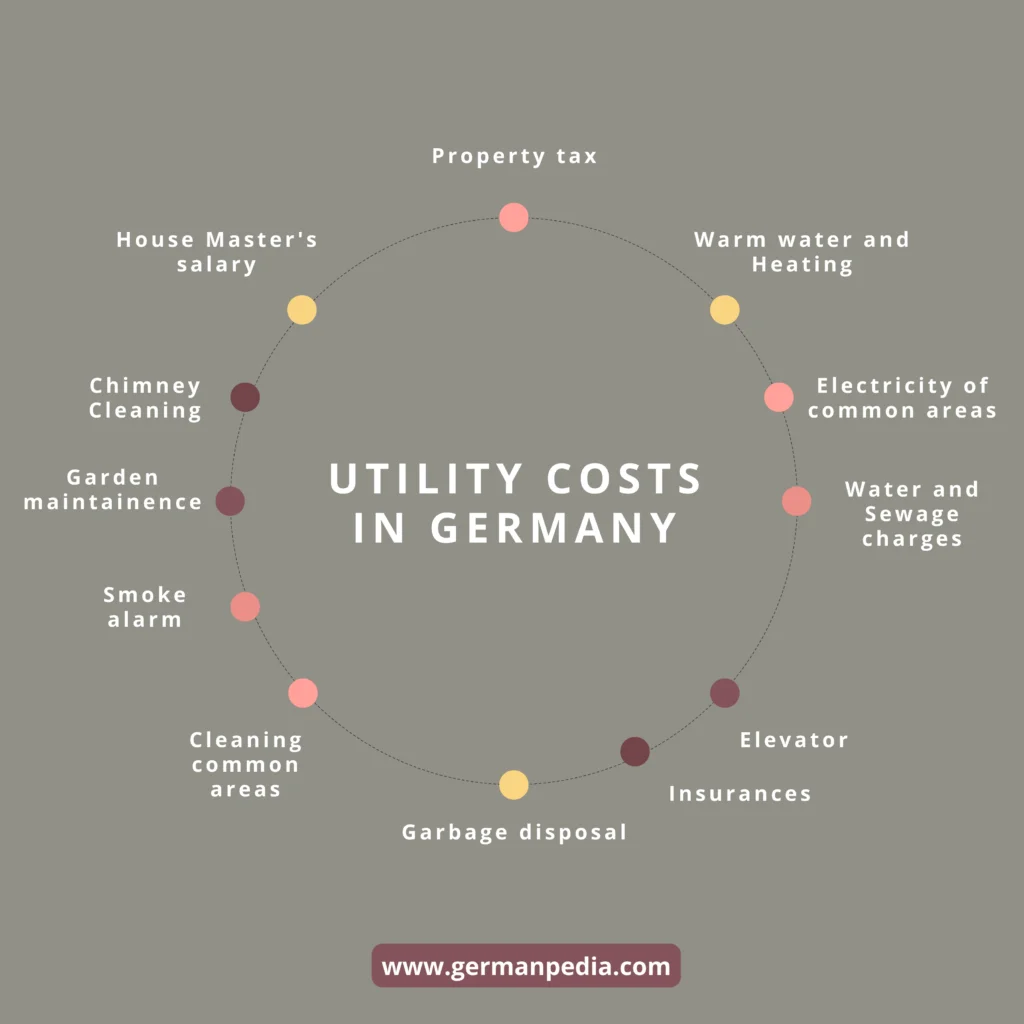
In Germany, the landlord must provide a yearly utility statement to the tenant. The document contains the actual utility costs.
You pay the utility charges (Nebenkosten) in advance every month as part of your warm rent. Hence, you and the landlord can use this document to compare how much you paid and the actual costs.
The landlord reimburses the difference if the tenant pays more than the actual costs. Similarly, if the tenant paid less, then they gets the invoice from the landlord.
What costs are part of Nebenkostenabrechnung?
The landlord cannot transfer all the costs to the tenant to operate and maintain the property. The expenses that the landlord can transfer are called umlagefähigkosten in German.
The following expenses come under umlagefähigkosten:
- Property tax (Grundsteuer)
- Warm water and heating costs (Warmwasser und Heizkosten)
- Water and Sewage charges (Wasser- und Abwassergebühren)
- Elevator costs (Aufzug)
- Garbage disposal and street cleaning (Müllabfuhr und Straßenreinigung)
- Cleaning of common areas like stairs, cycle room, etc. (Hausreinigung)
- Maintenance of garden (Gartenpflege)
- House Master’s salary (Hausmeister)
- Electricity costs for lighting common areas (Beleuchtung)
- Costs of cleaning the chimney (Schornsteinfeger)
- Insurances like property building insurance (Versicherungen)
- Smoke alarm (Rauchmelder)
- Other costs Sonstige Betriebskosten/Nebenkosten
Rental contract
People often sublet their room or apartment for a few months to others without a rental contract.
It is very common among international students.
Students return to their hometowns during holidays and sublet their rooms for a month or two without a rental contract.
What does a rental contract look like in Germany?
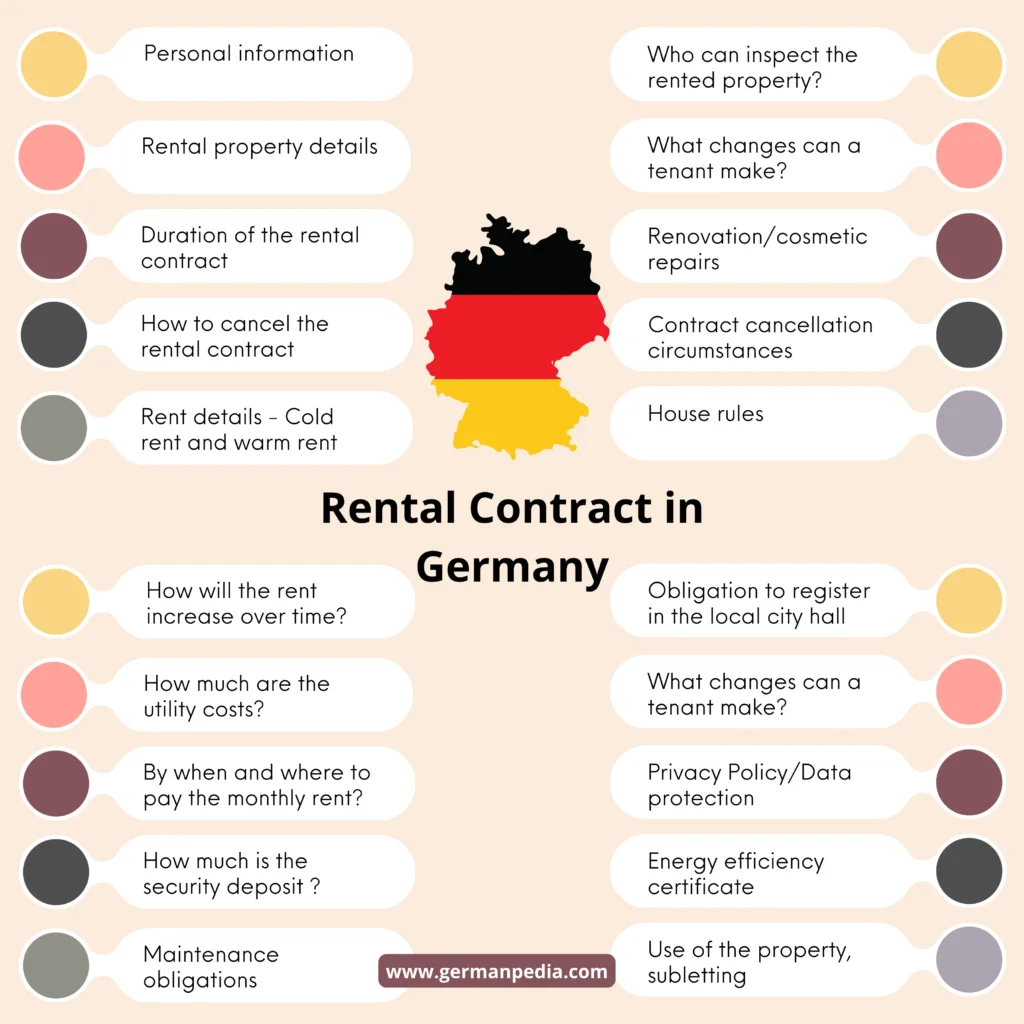
A rental contract has the following sections:
- Personal information of both parties
- Rental property details like the address
- Duration of the rental contract – In Germany, landlords are not allowed to draft a limited-period contract.
- How to cancel the rental contract, and what is the notice length?
- Rent details – Cold rent and warm rent.
- How will the rent increase over time? – Index rent (Indexmiete) or Graduated rent (Staffelmiete)
- How much are the utility costs (Nebenkosten), and what is included?
- By when and where to pay the monthly rent? – Bank account details of the landlord and the tenant.
- How much is the security deposit (Kaution)? – It’s usually three months’ rent (cold rent).
- Liability of the landlord, use of the property, subletting, house rules, and pet policy
- Maintenance obligations of the rental property
- Who can inspect the rented property, and under what circumstances?
- What changes can a tenant make inside and outside the rental property?
- Renovation/cosmetic repairs of the rented apartment
- Under what circumstances can the landlord terminate the tenancy agreement
- House rules of the rental property building
- Obligation to register in the local city hall (Rathaus)
- Privacy Policy/Data protection information (Datenschutzhinweise)
- Energy efficiency certificate
You can learn more in our guide on rental contracts in Germany. You can download a free copy of the sample rental contract in Germany here.
Free Download of Rental Contract Template
- Download and have a look at what a standard rental agreement looks like in Germany.
- You can even download the “docx” version that you can modify to fit your needs.
How to find a rental property in Germany from abroad
It can be challenging to find an apartment if you are not in Germany or in the city you are looking for a rental property. One way to solve it is to rent a furnished short-term apartment.
They are comparatively expensive but save you a lot of time and stress. And once you are in Germany, you can continue your search.
But you need to be patient, as finding a rental property in Germany can take several days to several months, depending on the time of the year and the city.
Here is the list of websites where you can find short-term furnished apartments.
One thing we like about these websites is the option to book a property online. It protects you from scammers that you may find on other popular property portals.
Ensure that you can register at the Rathaus using the short-term rental address. Else as mentioned earlier, you won’t be able to get your tax id and other vital documents.
Tips and tricks for renting an apartment in Germany
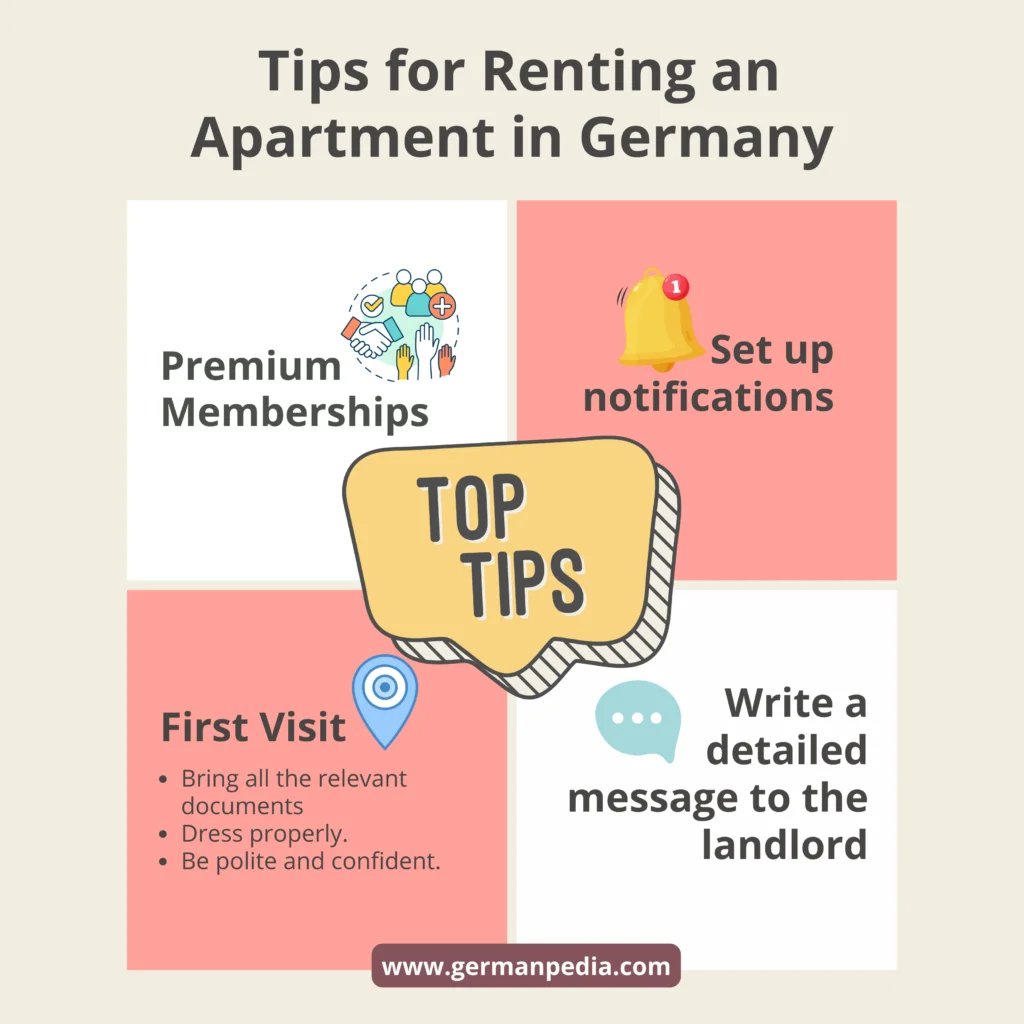
Premium Membership
We recommend taking premium memberships of online property portals like Immobilienscout24.
Here are the benefits of premium membership.
- Messages from premium members are shown on the top.
- You get access to the data like how many people already applied for the rental apartment.
- Some rentals are visible to premium members only.
Thus, a premium membership increases your chances of finding an apartment for rent tremendously.
Set up notifications
Every online portal offers the option to set up alerts. Hence, use this feature.
It allows you to react the moment you receive a notification.
Write a detailed message to the landlord
As mentioned earlier, your first message to the landlord decides if you’ll get a reply. Hence, use the template shared above while sending a message.
First Visit
- Ensure to bring a copy of all the relevant documents with you. If the landlord or real estate agent needs a hard copy, you can give them.
- Dress properly.
- Be polite and confident.
7 things you need to do after moving into a rental property
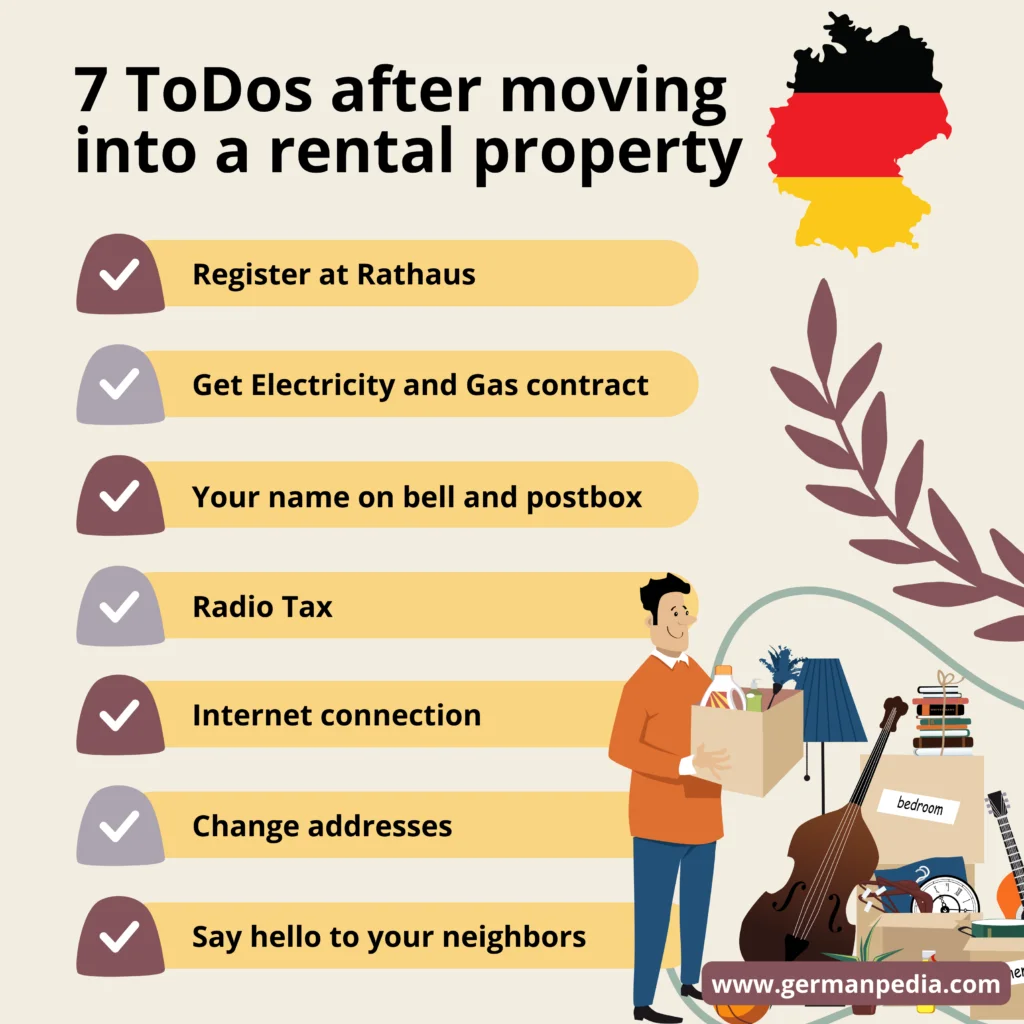
Register at Rathaus
First and foremost, register yourself and your family at Rathaus within 14 days of moving into a new apartment.
Electricity and Gas contract
If electricity or heating is not part of the utility costs (Nebenkosten), you must cover them yourself.
By default, EnBw will be your provider. But the contract with EnBw is expensive as compared to other providers.
Hence, check out comparison portals like Check24* and Verviox* to find cheap electricity* and gas* providers.
TIP: Change your electricity and gas providers every year to enjoy a “new customer” bonus and other offers. Hence, saving around 300 to 500 € in 10 mins.
Internet connection
The Internet is another basic need nowadays. Hence, get an internet connection for your new place.
We recommend signing a contract before moving into the new apartment. You can compare different internet providers on Check24* or Verivox*.
Find the best internet plans in Germany
- Compare internet service providers and their offers.
- Filter the results based on your requirements.
- Apply for the best internet plan on the portal directly.
Radio Tax
Every household in Germany must pay “Radio Tax.”
Normally, ARD ZDF stops charging radio tax for your old residence and starts charging for your new one once you register at the Rathaus. But if it doesn’t happen, you can deregister your old household online.
Your name on the apartment’s bell and postbox
Sometimes landlord puts your name on the bell and the postbox. Sometimes you have to do it yourself.
Change addresses everywhere
Changing addresses in your bank accounts, insurance providers, subscriptions, etc., can be a lot. Moreover, you may forget to change an address in some places.
To solve this problem, Deutsche Post offers a forwarding service at a very reasonable price of 38 € (approx. as of July 2023).
Under this yearly service, all the posts addressed to your old address will be forwarded to your new address without charge.
We recommend taking this service for at least 6 months to ensure you receive all your important posts.
Say hello to your neighbors
It’s always nice to ring the bell of your neighbors and introduce yourself. This way, not only do you make new friends, but you can clarify any questions you might have.
10 mistakes foreigners make while living in a rented apartment in Germany
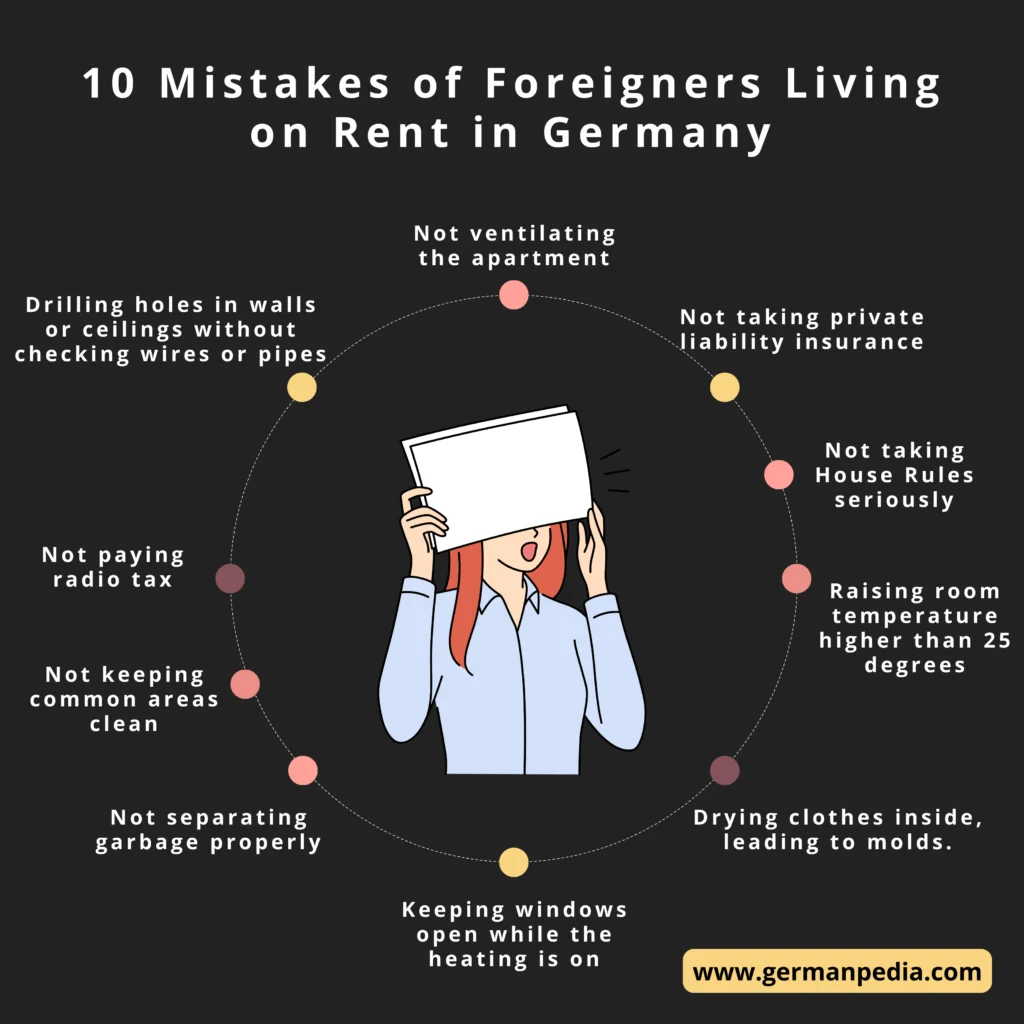
Every country has a different culture, beliefs, and way of living. Germany is no different. Hence, knowing how the Germans live can make your journey to settle in Germany much easier.
Here are the common mistakes expats make:
- Not ventilating the apartment in summers and winters
- Not taking good private liability insurance (Haftpflichtversicherung) to protect yourself if you accidentally damage the rented property in Germany.
- Drying clothes inside the house. Hence, leading to molds.
- Raising the room temperature higher than 25 degrees Celsius. Hence, damaging the wallpaper.
- Keeping windows open while the heating is on.
- Either not aware of or do not take the House Rules seriously.
- Not separating the garbage properly.
- Not keeping the common areas clean.
- Not paying the mandatory ARD radio tax.
- Drilling holes in the walls or ceilings without caring for the wires or pipes inside the wall.
Learn more about how to fix or avoid these mistakes here.
In the end
Be patient and look for a rental property on various websites and groups. Yes, it is difficult to find a nice place to rent. But it’s not impossible.
So, keep looking and be cautious of scammers.
Expats guide to buying a house in Germany

- The process of buying a house in Germany.
- How do you evaluate a property in Germany?
- What documents should you check before buying a house in Germany?
- How do you get a mortgage from a German bank?
- Tips and tricks to save thousands of euros.
- Average renovation costs in Germany and more…
